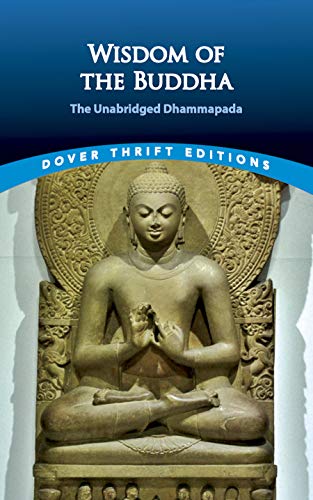
Synopsis
Few of the sacred texts of the world's great religions present their wisdom with the clear simplicity of the verses of the Buddhist Dhammapada, or Path to Virtue. Its direct style, clarity, and beauty place it at the forefront of Buddhist sacred literature, and its noble intent raises it to the highest level of humanity's spiritual guides. Easily accessible to any reader, the Dhammapada offers a wealth of wisdom for the novice, as well as the most ardent and experienced of spiritual seekers.
Gathered by Buddhist masters into related groups — "On Earnestness," "Flowers," "The Fool," "The Wise Man," "Happiness," "Pleasure" — these ancient texts transcend the limitations of time, tradition, and culture to express the ethical principle underlying all wise and compassionate philosophy and conduct. Here are the Four Truths that reveal the nature of the world and our lot in it; here also is the Eightfold Path, the way to enlightenment, incorporating the means to overcome the essential suffering revealed by the Four Truths as the essence of life. The Dhammapada serves as a coherent summation of the necessities for following the Eightfold Path as well as an encouraging and thought-provoking resource to consult along the way.
Expressed with great beauty and translated with painstaking scholarship, this classic guide is certain to stimulate, challenge, and inspire students of religion and philosophy as well as all who thirst for enlightenment.
"synopsis" may belong to another edition of this title.
About the Author
Friedrich Max Müller (6 December 1823 – 28 October 1900), generally known as Max Müller, was a German-born philologist and Orientalist, who lived and studied in Britain for most of his life. He was one of the founders of the western academic field of Indian studies and the discipline of comparative religion.
In 1844, prior to commencing his academic career at Oxford, Müller studied in Berlin with Friedrich Schelling. He began to translate the Upanishads for Schelling, and continued to research Sanskrit under Franz Bopp, the first systematic scholar of the Indo-European languages.
Swami Vivekananda, who was the foremost disciple of Ramakrishna Paramahamsa, met Max Muller over a lunch on 28 May 1896. Regarding Max Müller and his wife, the Swami later wrote:
The visit was really a revelation to me. That little white house, its setting in a beautiful garden, the silver-haired sage, with a face calm and benign, and forehead smooth as a child's in spite of seventy winters, and every line in that face speaking of a deep-seated mine of spirituality somewhere behind; that noble wife, the helpmate of his life through his long and arduous task of exciting interest, overriding opposition and contempt, and at last creating a respect for the thoughts of the sages of ancient India — the trees, the flowers, the calmness, and the clear sky — all these sent me back in imagination to the glorious days of ancient India, the days of our brahmarshis and rajarshis, the days of the great vanaprasthas, the days of Arundhatis and Vasishthas. It was neither the philologist nor the scholar that I saw, but a soul that is every day realizing its oneness with the universe.
Max Müller's translation of Dhammapada from the Pali is one of most important translations in the domain of Buddhism.
Language Notes
Text: English (translation)
"About this title" may belong to another edition of this title.
Other Popular Editions of the Same Title
Search results for Wisdom of the Buddha: The Unabridged Dhammapada (Dover...
Wisdom of the Buddha: The Unabridged Dhammapada (Dover Thrift Editions: Religion)
Seller: BooksRun, Philadelphia, PA, U.S.A.
Paperback. Condition: Fair. Unabridged. The item might be beaten up but readable. May contain markings or highlighting, as well as stains, bent corners, or any other major defect, but the text is not obscured in any way. Seller Inventory # 0486411206-7-1
The Wisdom of the Buddha The U
Seller: World of Books (was SecondSale), Montgomery, IL, U.S.A.
Condition: Acceptable. Item in very good condition! Textbooks may not include supplemental items i.e. CDs, access codes etc. Seller Inventory # 00076730137
The Wisdom of the Buddha The U
Seller: World of Books (was SecondSale), Montgomery, IL, U.S.A.
Condition: Very Good. Item in very good condition! Textbooks may not include supplemental items i.e. CDs, access codes etc. Seller Inventory # 00095203430
Wisdom of the Buddha: The Unabridged Dhammapada (Dover Thrift Editions)
Seller: Your Online Bookstore, Houston, TX, U.S.A.
Paperback. Condition: Good. Seller Inventory # 0486411206-3-20376664
Wisdom of the Buddha: The Unabridged Dhammapada (Dover Thrift Editions: Religion)
Seller: Orion Tech, Kingwood, TX, U.S.A.
paperback. Condition: Good. Seller Inventory # 0486411206-3-35459079
Wisdom of the Buddha: The Unabridged Dhammapada (Dover Thrift Editions: Religion)
Seller: Seattle Goodwill, Seattle, WA, U.S.A.
paperback. Condition: Good. Seller Inventory # mon0000264078
Wisdom of the Buddha : The Unabridged Dhammapada
Seller: GreatBookPrices, Columbia, MD, U.S.A.
Condition: good. May show signs of wear, highlighting, writing, and previous use. This item may be a former library book with typical markings. No guarantee on products that contain supplements Your satisfaction is 100% guaranteed. Twenty-five year bookseller with shipments to over fifty million happy customers. Seller Inventory # 439786-5
Wisdom of the Buddha: The Unabridged Dhammapada (Dover Thrift Editions: Religion)
Seller: Wonder Book, Frederick, MD, U.S.A.
Condition: Good. Good condition. A copy that has been read but remains intact. May contain markings such as bookplates, stamps, limited notes and highlighting, or a few light stains. Seller Inventory # P05B-03594
Wisdom of the Buddha: The Unabridged Dhammapada
Seller: ThriftBooks-Dallas, Dallas, TX, U.S.A.
Paperback. Condition: Good. No Jacket. Pages can have notes/highlighting. Spine may show signs of wear. ~ ThriftBooks: Read More, Spend Less. Seller Inventory # G0486411206I3N00
Wisdom of the Buddha: The Unabridged Dhammapada
Seller: ThriftBooks-Dallas, Dallas, TX, U.S.A.
Paperback. Condition: Fair. No Jacket. Readable copy. Pages may have considerable notes/highlighting. ~ ThriftBooks: Read More, Spend Less. Seller Inventory # G0486411206I5N00

